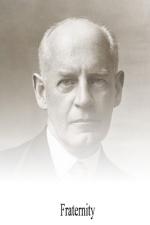Without intention Cecilia found herself before that picture. It stood with its face a little turned towards the wall, as though somewhat in disgrace, portraying the full-length figure of a girl standing in deep shadow, with her arms half outstretched, as if asking for something. Her eyes were fixed on Cecilia, and through her parted lips breath almost seemed to come. The only colour in the picture was the pale blue of those eyes, the pallid red of those parted lips, the still paler brown of the hair; the rest was shadow. In the foreground light was falling as though from a street-lamp.
Cecilia thought: “That girl’s eyes and mouth haunt me. Whatever made Blanca choose such a subject? It is clever, of course—for her.”
CHAPTER II
A FAMILY DISCUSSION
The marriage of Sylvanus Stone, Professor of the Natural Sciences, to Anne, daughter of Mr. Justice Carfax, of the well-known county family—the Carfaxes of Spring Deans, Hants—was recorded in the sixties. The baptisms of Martin, Cecilia, and Bianca, son and daughters of Sylvanus and Anne Stone, were to be discovered registered in Kensington in the three consecutive years following, as though some single-minded person had been connected with their births. After this the baptisms of no more offspring were to be found anywhere, as if that single mind had encountered opposition. But in the eighties there was noted in the register of the same church the burial of “Anne, nee Carfax, wife of Sylvanus Stone.” In that “nee Carfax” there was, to those who knew, something more than met the eye. It summed up the mother of Cecilia and Bianca, and, in more subtle fashion, Cecilia and Bianca, too. It summed up that fugitive, barricading look in their bright eyes, which, though spoken of in the family as “the Carfax eyes,” were in reality far from coming from old Mr. Justice Carfax. They had been his wife’s in turn, and had much annoyed a man of his decided character. He himself had always known his mind, and had let others know it, too; reminding his wife that she was an impracticable woman, who knew not her own mind; and devoting his lawful gains to securing the future of his progeny. It would have disturbed him if he had lived to see his grand-daughters and their times. Like so many able men of his generation, far-seeing enough in practical affairs, he had never considered the possibility that the descendants of those who, like himself, had laid up treasure for their children’s children might acquire the quality of taking time, balancing pros and cons, looking ahead, and not putting one foot down before picking the other up. He had not foreseen, in deed, that to wobble might become an art, in order that, before anything was done, people might know the full necessity for doing some thing, and how impossible it would be to do indeed, foolish to attempt to do—that which would fully




